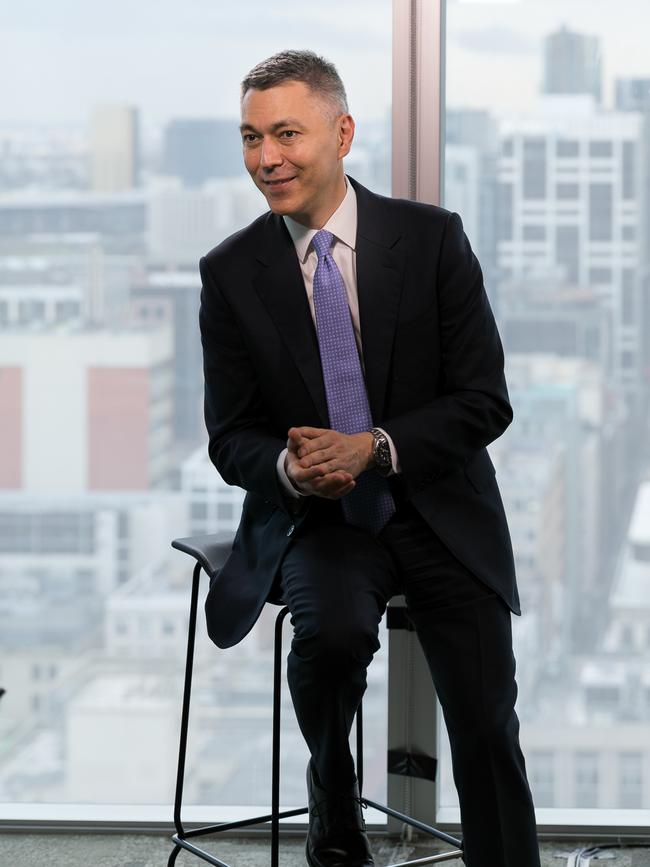Covid demand shock has passed: BHP
The miner still warned it could take two years for global economies to return to their earlier growth track.

BHP has warned it could take two years for global economies to return to their earlier growth track after the coronavirus crisis threat recedes, despite chief executive Mike Henry saying the “primary demand shock” of the pandemic has passed.
Mr Henry delivered his first set of annual financial accounts as the iron ore price again surged, with futures traded on the Singapore exchange punching through $US120 a tonne on Tuesday, the highest levels since 2014.
The strong iron ore prices that underpinned BHP’s $US7.95bn net profit for the financial year could continue, according to BHP’s economic outlook, with the company casting doubt on whether lost tonnes from Brazil and South Africa will return to the market, and saying it expects the Chinese steel industry to maintain a strong pace for the remainder of 2020.
Mr Henry told reporters that iron ore supply would recover, and said he expected to see “a bit of retracement in iron ore prices” as product returned to the market.
But while Mr Henry said BHP’s financial results, with only a 4 per cent drop in net profits despite the pandemic, showed the company’s operations were resilient in the face of most global events, the company says it believes it will take some time for developing nations to recover from the impact of the coronavirus even without the risk of secondary outbreaks.
“While the outlook for 2021 remains uncertain, within the scenarios that we consider, our base case has the world economy rebounding solidly during the year. There will, however, be considerable variation at the country level,” the company said.

“Even with this rebound, our base case is for the world economy to be 6 per cent smaller than it would otherwise have been in the 2021 calendar year. We expect that China and the OECD will return to their pre-COVID-19 trend growth rates from around 2023. Developing economies outside east Asia may take longer.”
The crash in oil and coal prices put a significant hole in BHP’s returns for the year, with earnings from BHP’s petroleum and coal divisions crumbling in the face of sharply lower prices. Its petroleum division booked earnings before interest and tax of $US750m for the year, down from $US2.48bn, and coal earnings slumped to $US811m, down from $US3.4bn.
That left iron ore as the primary factor underlying BHP’s broader results, with the surging iron ore price lifting EBIT from its Pilbara iron ore mines to $US12.9bn, well above the $US9.4bn the previous financial year, after BHP shipped 281 million tonnes from Port Hedland last financial year, selling 250.6 million tonnes on its own account and realising an average price of $US77.36 a wet metric tonne, before freight charges.
Benchmark prices for 62 per cent iron ore averaged about $US93.39 for the year, including freight to China.
The division booked revenue of $US20.8bn for the year, and underlying EBIT of $US12.9bn, well above the $US9.4bn the previous financial year.
But, even though BHP highlighted the growing threat China will open up a new iron ore province in Africa, as it looks to open up the giant Simandou deposit in Guinea, Mr Henry said he was confident the mining giant’s Australian iron ore mines could withstand the entry of more ore into the market.
“We will focus on bringing costs down, on making production more reliable, and increase productivity. And we’ve had steps under way to increase the quality of our existing portfolio,” he told reporters.
“That is the strategy. And we think it grows value in all scenarios. Even in a world where we see more tonnes coming out of Africa we think this is the right strategy.”
BHP declared a US55c a share final dividend, marginally below analyst expectations, bringing its total shareholder payout for the financial year to $US1.20 a share.
The mining giant said it had underlying after-tax profits of $US9bn, before one-off items worth $US1.1bn, on revenue of $US42.9bn and underlying earnings before interest, tax, depreciation and amortisation of $US22.07bn.
The result is slightly below analyst expectations, with consensus estimates tipping $US1.23 a share in total dividends for the year, on the back of revenue of $US43.1bn and underlying earnings before interest and tax of $US16.3bn.
Mr Henry said BHP believed the “primary demand shock” from the pandemic was behind it, but warned risks remained for commodity prices over the remainder of the current year.
“The potential for re-emergence of COVID-19 outbreaks in key markets or supply jurisdictions is the main source of uncertainty in our year-ahead outlook,” he said.
BHP also hung a sale sign on two of its Queensland metallurgical coal mines, and confirmed it will seek to exit its thermal coal business and Bass Strait oil and gas assets, as the company looks to tidy up its portfolio and prepare for future growth.
Mr Henry confirmed BHP would seek to sell its thermal coal mines — Mt Arthur in NSW and its share in the Cerrejon mine in Columbia. He also said BHP would seek to sell its 80 per cent stake in the BHP Mitsui Coal metallurgical coal business in Queensland.
BMC operates the South Walker Creek and Poitrel Mines, and Mr Henry said the operations were low cost, but produced a lower quality of coking coal than its core assets in Queensland.
“They produce good cashflow through the cycle and have the potential for value growth, including through productivity-driven volume growth, further cost reductions and embedded expansion options,” he said.
“Given our focus on hard coking coal, these assets would better compete for capital outside of BHP.”
BHP shares closed down 0.5 per cent, or 21c, on Tuesday at $39.65.




To join the conversation, please log in. Don't have an account? Register
Join the conversation, you are commenting as Logout